Want To Lose Weight?
If you "want to lose weight, then watch what you’re drinking!" is an adage we've all heard but rarely paid heed to. More often than not, our focus revolves around the food we consume, rather than the drinks we gulp down. This oversight can significantly impact our weight loss journey, sometimes making us wonder why we're not shedding the extra pounds despite maintaining a strict diet and exercise routine. In this comprehensive guide, we'll reveal the impact of various beverages on your weight and provide helpful alternatives to make your weight loss journey smoother.
Empower Your Health Journey – Explore My Free Apps for a Vibrant, Healthier Lifestyle Today!
The Hidden Culprit: Watch What You’re Drinking
When discussing the topic of weight loss, the majority of people are aware that it necessitates a reduction in calorie intake combined with an increase in calories burned through physical activity. There's a widely shared understanding that maintaining a healthy diet and exercising regularly are the main pillars of successful weight loss. However, there's a critical aspect often overlooked in our quest to shed the excess pounds – our drinking habits.
This underestimation of our beverage consumption is rather surprising, given that our drinks often contain a significant amount of calories, just like the food we eat. The calories we consume from our drinks might not seem much in isolation, but when tallied up, they can contribute substantially to our daily caloric intake. This is an easy trap to fall into, especially since many of us may not even realize we're consuming these 'hidden' calories.
What's more concerning is that some beverages can hinder our weight loss efforts beyond just contributing to our calorie count. Certain drinks might trigger cravings for unhealthy foods, disrupt our metabolic processes, or lead to bloating and water retention. All of these can throw a spanner in the works of our weight loss goals.
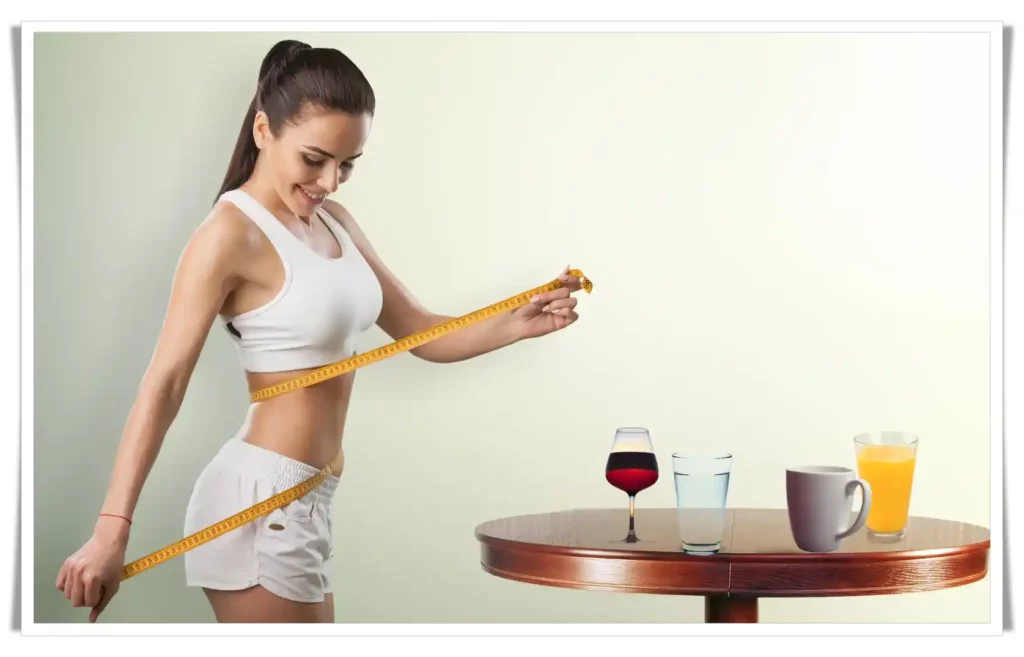
To truly embrace a holistic approach to weight loss, we need to acknowledge and understand the role our drinks play in this process. Just as we scrutinize food labels and monitor our food intake, we should also pay attention to what we're sipping throughout the day.
From the glass of wine during dinner, the mid-morning latte, the afternoon diet soda, to the energy drink during your workout, each beverage you consume has an impact. Therefore, if you're someone who truly wants to lose weight, watching what you're drinking is as crucial as keeping track of what you're eating. Remember, every drop counts when it comes to calories. Achieving your weight loss goals involves not just monitoring the solid calories you consume but the liquid ones as well.
Alcohol: A Weight Loss Inhibitor
When it comes to assessing our dietary habits, many of us are skilled at scrutinizing the food we consume. We meticulously pore over the nutritional information on food labels, trying to gauge what belongs on our plates and what doesn't. But do we apply the same level of analysis to our alcoholic beverages? More often than not, the answer is no. This lack of attention can result in alcohol becoming a considerable obstacle in our weight loss journey.
Despite being a common feature in many of our social and leisure activities, alcohol is laden with 'empty' calories — those that provide energy but lack nutritional value. A casual drink here and a social tipple there can quickly accumulate, leading to a significant increase in our daily calorie intake. For instance, a standard glass of wine contains approximately 125 calories, while a pint of beer can contain upwards of 150 calories. This may not seem alarming initially, but consider the impact of having a couple of drinks a day over a week or a month — the calories swiftly add up.
Furthermore, alcohol is renowned for its ability to slow down the rate at which your body burns calories. When alcohol is in your system, your body prioritizes metabolizing the alcohol over burning fat and carbohydrates, which can lead to weight gain. This phenomenon, when combined with a high-calorie diet, can contribute to the development of the infamous 'beer belly'.
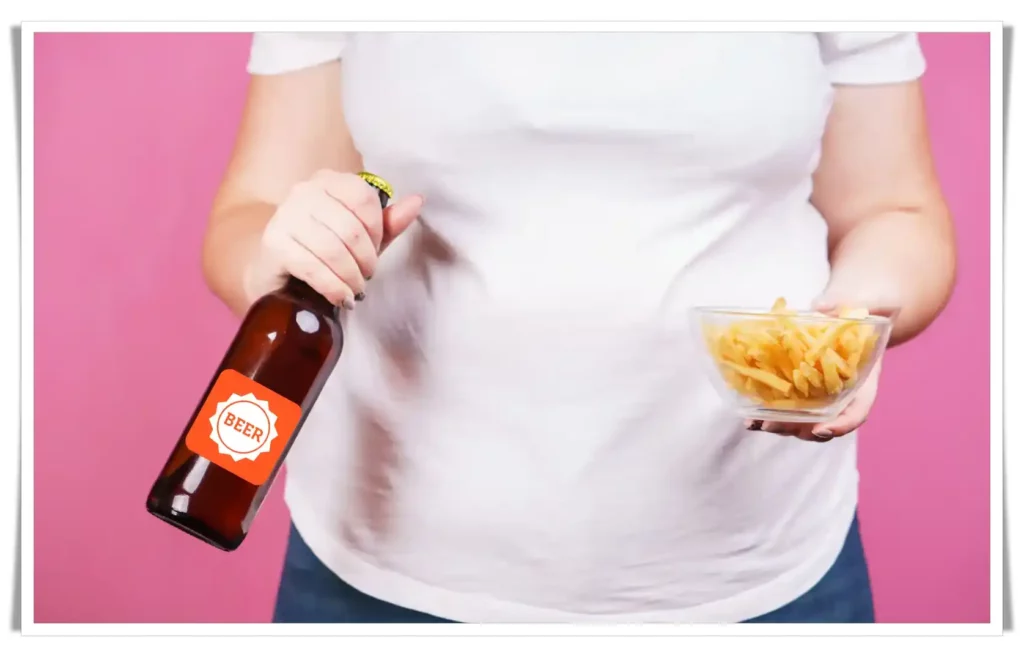
Additionally, alcohol is not just detrimental due to its caloric content and metabolism interference. It also poses a threat to your weight loss endeavors by inciting unhealthy cravings. After a few drinks, the resolution to stick to a healthy diet can waver, leading you to indulge in late-night snacks or greasy fast food. This effect is due to alcohol's ability to lower inhibitions, making that greasy kebab or cheese-loaded pizza appear much more appealing than when you're sober.
In essence, if you're serious about your weight loss journey, it's crucial to monitor your alcohol consumption rigorously. It doesn't mean you need to abstain completely, but being aware of its impacts and exercising moderation can go a long way in ensuring alcohol doesn't become an unwelcome hitchhiker on your weight loss journey.
The Tea and Coffee Conundrum
An essential part of the day for millions of people worldwide, tea and coffee are often relied upon for that much-needed boost of energy. From the first cup in the morning to the last one in the afternoon, these caffeinated beverages have become an integral part of our routines. However, when it comes to weight loss, these daily beverages present a puzzling situation. Are they allies or adversaries in our pursuit of healthier body weight?
On one hand, coffee, and tea, particularly green tea, have been touted for their potential weight loss benefits. Studies have indicated that caffeine, an active ingredient in both these beverages, can boost metabolism and enhance fat burning in the short term. Moreover, green tea is rich in antioxidants known as catechins, which, coupled with caffeine, may enhance fat oxidation.
However, the narrative isn't as straightforward as it seems. The stimulating effects of caffeine may not always work in favor of those wanting to lose weight. The energy boost that follows a cup of coffee or tea can lead to increased cravings. This is because caffeine can stimulate the release of the hormone cortisol, which can lead to an increase in appetite.

Furthermore, the culture of 'tea or coffee time' often involves reaching out for a biscuit, a piece of cake, or some other snack. In this scenario, even if the beverage itself isn't causing harm, it indirectly encourages a snacking habit. These snacks, often high in sugar and unhealthy fats, can add significant calories to your diet, thereby counteracting your weight loss efforts.
Green tea, while celebrated for its weight loss benefits, isn't immune to this predicament. Despite the numerous studies suggesting that green tea extract may aid weight loss, drinking it in excess can lead to the same negative effects associated with high caffeine intake. These effects can range from sleep disturbances and increased heart rate to an upset stomach and increased nervousness.
Therefore, when navigating the tea and coffee conundrum, moderation is key. A cup or two may potentially aid your weight loss goals, but it's crucial to be mindful of your overall caffeine intake. Additionally, resist the urge to always pair your drink with a snack, especially if it's high in calories. Remember, the aim is to form habits that promote weight loss, and it's these small changes that can make a significant difference in your journey.
Juice: The Deceptive Choice
As we strive towards healthier lifestyles and better dietary choices, it's not uncommon to swap fizzy, sugary drinks with what is generally perceived as a healthier alternative — fruit juice. After all, fruit is healthy, so fruit juice must be too, right? Unfortunately, this assumption isn't entirely correct and can often lead to the deceptive choice of consuming fruit juices when trying to lose weight.
Indeed, fruit juices, especially those freshly squeezed or labeled as '100% juice', do offer more nutritional benefits compared to sugary sodas. They are a source of essential nutrients like Vitamin C and potassium, which are vital for overall health. However, when it comes to weight loss, these juices may not be the virtuous beverage they are often presumed to be.
The main issue lies in the high sugar content of fruit juices. When fruit is juiced, the natural sugars are extracted along with the juice while the fiber is left behind. This results in a beverage that can have as much sugar, sometimes even more, as a sugary soft drink. For instance, a 250ml glass of unsweetened apple juice can contain around 24g of sugar, which is approximately six teaspoons. Now, compare this with the same amount of cola, which has around 26g of sugar. The numbers are alarmingly close.
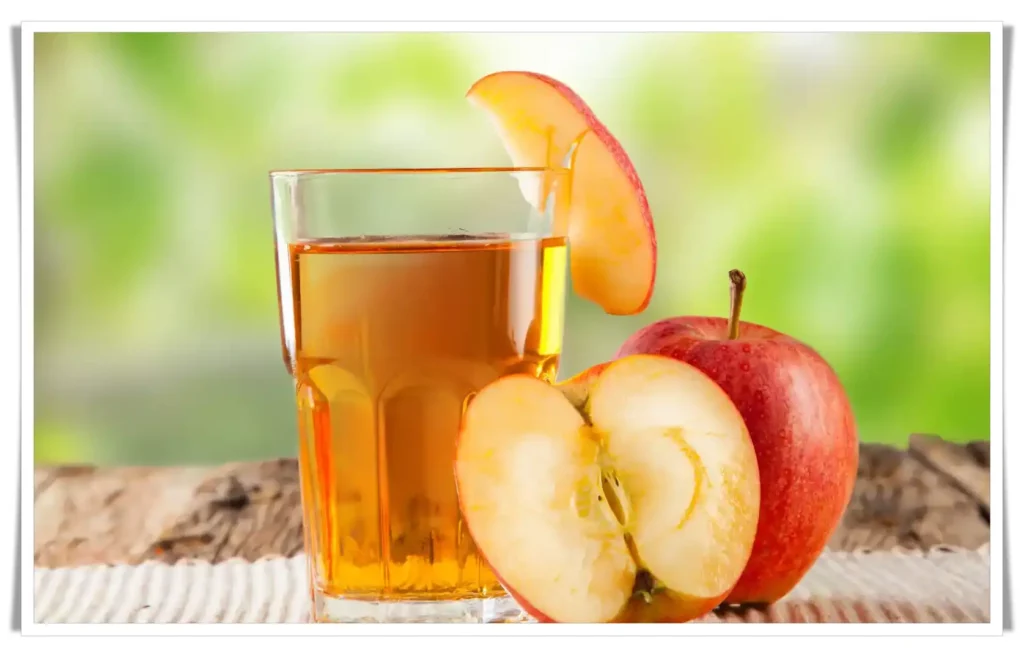
The absence of fiber in juice is another concern. Fibre plays a significant role in promoting a feeling of fullness, which can help control your overall food intake. However, when you consume fruit in juice form, you're missing out on this valuable fiber, leading to a beverage that's less satiating than whole fruit. Consequently, you may find yourself feeling hungry sooner, which can lead to increased calorie consumption.
Moreover, the high sugar content in fruit juice can cause a spike in blood sugar levels. The subsequent drop in blood sugar can leave you feeling hungry and result in overeating, which is counterproductive to your weight loss goals.
To sum up, while fruit juice might seem like a healthy choice, it's not the ideal beverage for those wanting to lose weight. If you enjoy fruit juice, consider limiting your intake or diluting it with water to reduce the sugar content. Alternatively, opt for whole fruits over juice, as they provide all the nutritional benefits along with the crucial addition of fiber. It's these mindful choices that will ultimately contribute to a successful weight loss journey.
Water: The Weight Loss Ally
In the vast landscape of weight loss strategies, there's one ally that is often underestimated despite its proven effectiveness — water. This humble, calorie-free beverage, integral to our existence, can be a game-changer in our pursuit of weight loss.
Water plays multiple roles when it comes to maintaining healthy body weight. As the most fundamental element of life, it is essential for keeping you hydrated, particularly during workouts. Adequate hydration ensures optimal performance during exercise, allowing you to push harder and burn more calories.
But the benefits of water go beyond just hydration. One of the key ways water aids weight loss is by helping to manage hunger. You see, our bodies sometimes confuse thirst for hunger. Therefore, staying well-hydrated can help prevent overeating which is often mistaken for hunger.
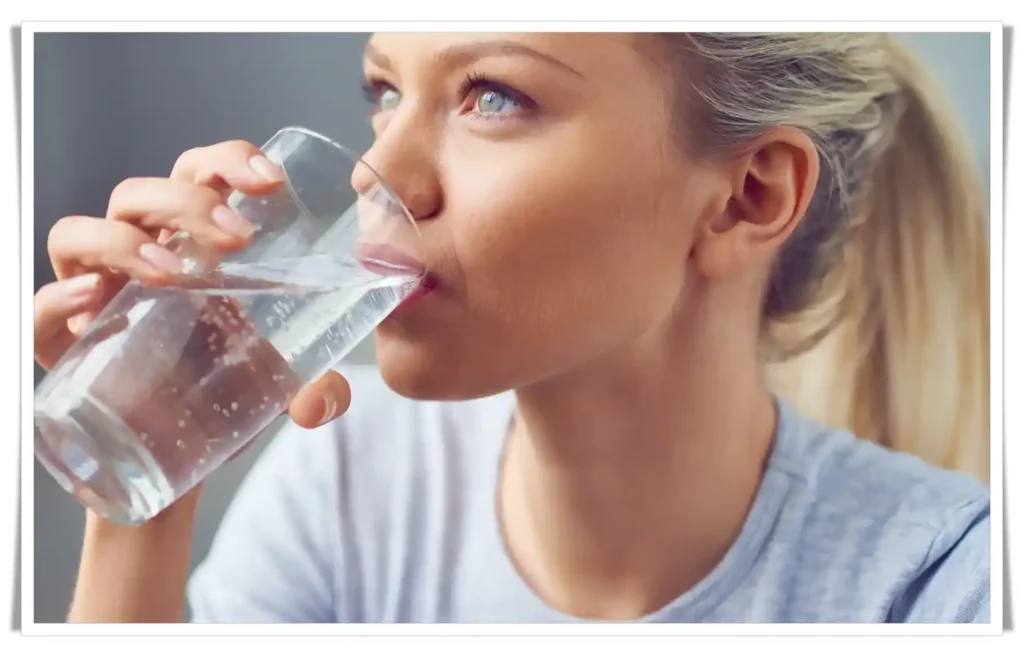
Research supports this too. A study published in the journal 'Obesity' found that participants who drank about half a litre of water 30 minutes before their meals lost 44% more weight than those who didn't. This strategy, as simple as it sounds, can help control portion sizes by promoting a feeling of fullness before meals, thereby reducing the overall calorie intake.
Furthermore, regularly replacing high-calorie drinks like coffee with milk and sugar, alcohol, and sugary soft drinks with water can significantly decrease your daily calorie intake. This replacement strategy is especially beneficial for those who consume these beverages habitually. The reduction in calories can have a profound impact on your weight loss journey over time.
Let's not forget that water is the primary vehicle for transporting nutrients and oxygen throughout the body, eliminating waste, and supporting essential bodily functions. These roles indirectly contribute to weight loss by keeping your body's metabolic processes running efficiently.
In summary, water, with all its simplicity, is a critical ally on your weight loss journey. So the next time you feel a pang of hunger, consider reaching for a glass of water first. Not only will it keep you hydrated, but it could also keep unnecessary cravings and calories at bay. It's no miracle cure, but when it comes to weight loss, water comes pretty close.
Please, read the related article: "The Best Reasons For Drinking Water"!
The Impact of Various Drinks on Weight Loss
When embarking on a weight loss journey, it's important to be aware that every component of your dietary intake counts, including what you choose to drink. A closer inspection of your drinking habits can reveal hidden culprits hindering your weight loss progress. Each type of drink you consume can have varying effects on your weight, some supportive, and others detrimental.
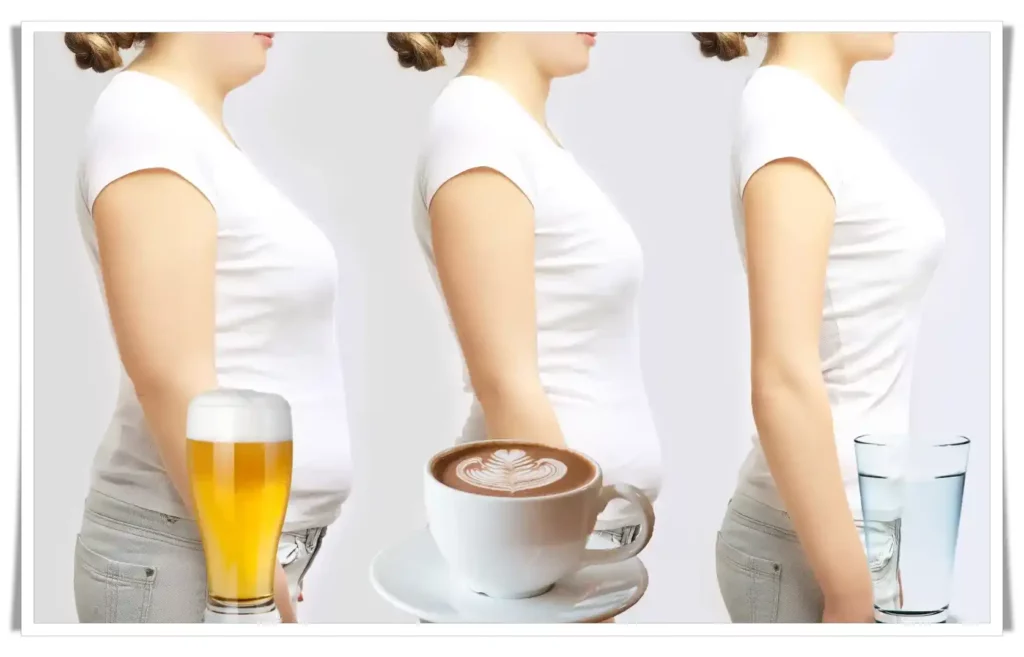
Alcoholic Drinks: The Calorie-Packed Treat
Many of us enjoy a glass of wine or a pint of beer now and then. While they can add to the enjoyment of a social gathering, these alcoholic drinks are often packed with calories. What's more, alcohol has a way of stimulating your appetite, leading to excess calorie consumption. Studies have also found that alcohol can decrease the rate at which your body burns fat, further impacting weight loss.
Tea and Coffee: The Double-Edged Swords
These everyday beverages can be a bit of a mixed bag when it comes to weight loss. On the one hand, black coffee and unsweetened tea can be beneficial for weight loss as they contain minimal calories. On the other hand, if you're adding milk, cream, or sugar to your coffee or tea, the calories can quickly add up.
Furthermore, caffeinated drinks can interfere with weight loss. The stimulation they provide may heighten cravings and lead to snacking. However, green tea has been recognized for its potential weight loss benefits, thanks to its catechin content, but overconsumption can lead to adverse caffeine effects.
Fruit Juice: The Sweet Deception
While fruit juice may seem like a healthy alternative to sugary soft drinks, it can be surprisingly high in sugar and calories and lacking in fiber. This combination can lead to increased blood sugar levels and hunger, hindering your weight loss efforts.
Water: The Weight Loss Ally
Water is, without a doubt, the best beverage choice for weight loss. With zero calories, it aids in hydration, promotes feelings of fullness, helps control portions, and reduces overall calorie intake when used as a replacement for high-calorie drinks.
Understanding the impact of these various drinks on your weight loss journey is crucial. It allows you to make informed decisions and ensure that your drink choices support, rather than hinder your weight loss goals. Making mindful decisions about what you're drinking is just as important as watching what you're eating. So, next time you reach for a drink, remember to consider its impact on your weight loss journey.
How to Navigate Your Beverage Choices
As we've discovered, not all drinks are created equal, especially when it comes to weight loss. It's clear that the beverages you choose to consume can either support or undermine your weight loss goals. So, how can you navigate your beverage choices effectively?
Understand Your Drinks
The first step is to understand the nutritional content of the drinks you consume regularly. Investigate the calorie content, sugar levels, and other nutritional aspects of these drinks. Some beverages might seem healthy but could be adding significant unnecessary calories to your diet. Armed with this information, you can make more informed decisions about what you drink.
Hydrate with Water
The simplest and most effective strategy is to hydrate predominantly with water. As we've seen, water has multiple benefits, from promoting feelings of fullness to replacing high-calorie drinks. Drinking a sufficient amount of water daily is a healthy habit that can support your weight loss goals.
Limit Alcohol Consumption
When it comes to alcohol, moderation is key. Alcohol is high in calories and can stimulate appetite, making it easier to overeat. Therefore, it's best to limit alcohol consumption or opt for lower-calorie alternatives when available.
Beware of Added Sugars
Watch out for added sugars in drinks, particularly in soft drinks, fruit juices, and coffee or tea. These sugars can add a significant number of calories and increase your blood sugar levels, leading to hunger and weight gain.
Opt for Green Tea
If you're a fan of hot drinks, consider green tea as an alternative to caffeinated beverages. While it contains some caffeine, green tea is also packed with beneficial antioxidants and compounds that have been linked to weight loss. But remember, moderation is essential here as well.
Smoothies and Protein Shakes
When made with healthy ingredients and no added sugars, smoothies, and protein shakes can be a great way to incorporate nutrition into your diet without adding excessive calories. They can also help keep you full, reducing the likelihood of snacking on unhealthy foods.
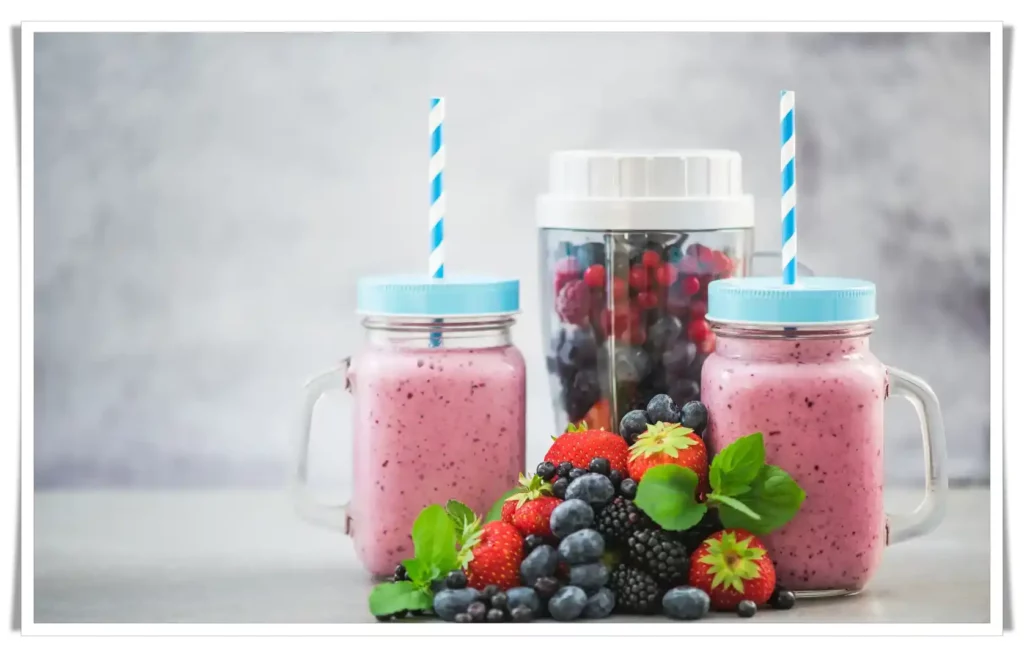
Navigating your beverage choices might seem daunting initially, but with knowledge and a little bit of planning, you can ensure your drinks align with your weight loss objectives. Remember, each small, conscious choice can bring you one step closer to your goal. After all, if you want to lose weight, it's not just about watching what you're eating, but also what you're drinking.
Pertinent Scientific Study: The Relationship Between Beverages and Weight Loss
To understand the impact of beverage choices on weight loss, it's essential to consider the evidence from scientific research. A particularly insightful study that delves into this topic is titled "Beverage Consumption Habits and Association with Total Water and Energy Intakes - Full Study"
The study takes an in-depth look at how our drinking habits influence our overall energy intake, which directly impacts weight loss and management. The researchers considered various types of beverages, including water, alcoholic drinks, and sugary beverages, examining their associations with overall energy intake.
The findings of the study are enlightening. Water and unsweetened beverages were found to be linked with lower total energy intake. This means that individuals who predominantly consumed these types of beverages generally consumed fewer calories over the course of the day. This lower caloric intake can significantly aid in weight loss and management.
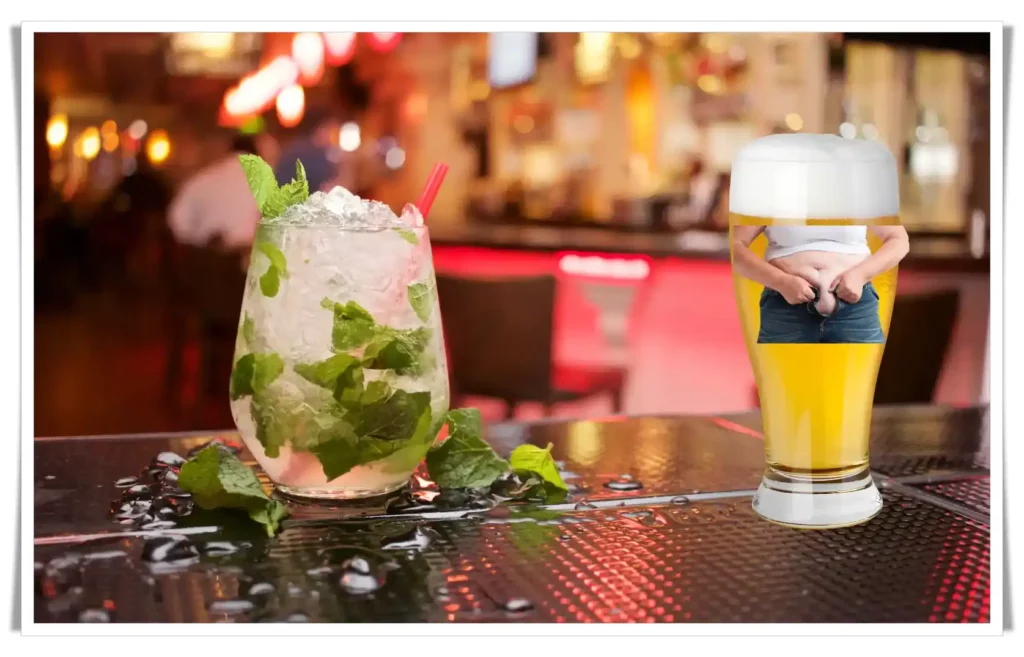
In contrast, beverages high in sugar or alcohol content were associated with greater energy intake, leading to an increased likelihood of weight gain and difficulty in managing weight.
The conclusion drawn from this study is quite clear: if you want to lose weight, you need to carefully watch what you're drinking. Replacing high-calorie beverages with water or unsweetened drinks can have a beneficial impact on your total calorie consumption, aiding in weight loss and healthier weight management.
These findings underscore the critical role of our beverage choices in weight loss, supporting the idea that healthy hydration habits – such as consuming water or unsweetened beverages – can be a simple, yet effective strategy in achieving and maintaining a healthy weight.
Table of Caloric Content in Common Drinks
| Drink | Average Calorie Content |
|---|---|
| Beer (355ml) | 150 Calories |
| Red Wine (148ml) | 125 Calories |
| Apple Juice (248ml) | 114 Calories |
| Coffee (black) (240ml) | 2 Calories |
| Water (240ml) | 0 Calories |
FAQs
1. Are diet sodas good for weight loss?
While diet sodas are marketed as a low-calorie alternative to regular sodas, they often lead to sugar cravings due to their artificial sweeteners. It's better to hydrate with water or other non-sugary drinks.
2. Does the timing of drinking water affect weight loss?
Yes, drinking water before meals can help control your portion size and reduce overeating, aiding weight loss.
3. Is it okay to drink alcohol in moderation during a weight loss regimen?
While moderate alcohol consumption may not drastically affect weight loss, it's important to remember that alcohol adds to your daily caloric intake and can lead to unhealthy cravings.
Call to Action
We hope this guide on how to [want to lose weight, watch what you’re drinking] has been insightful. If you have any questions or thoughts, please feel free to leave a comment below. Also, don't forget to check our other related articles like "Drink Water with Meals: A Secret to Satiety and Weight Loss" and our YouTube video on "The Best Reasons For Drinking Water".
Conclusion
In our quest to lose weight, watching what we eat is only half the battle. If you genuinely want to lose weight, watch what you're drinking as well. From the alcohol you might enjoy occasionally to the coffee you can't do without every morning, each drink plays a significant role in your weight loss journey. Let's imbibe healthier drinking habits for a healthier, happier, and fitter life!

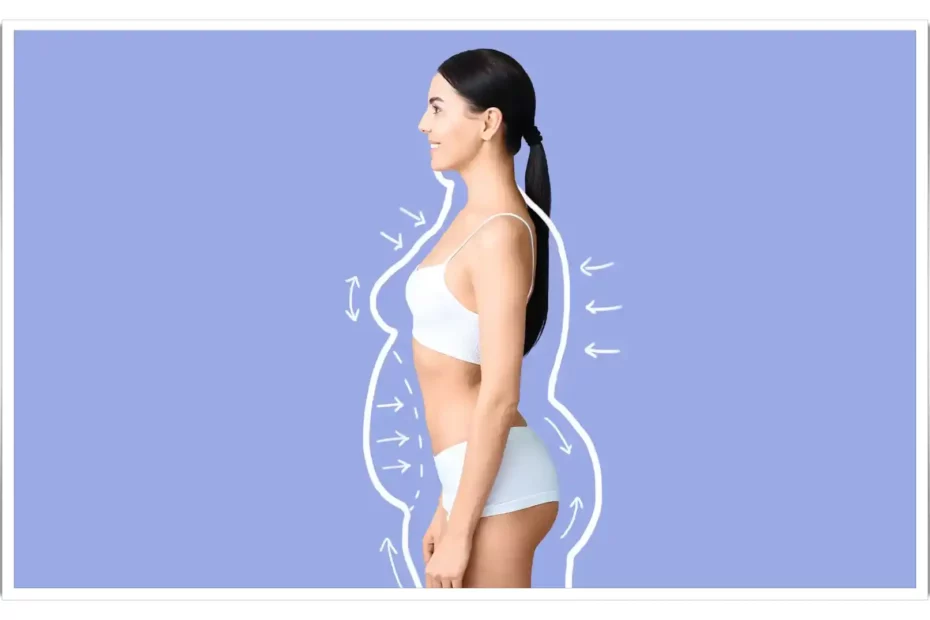
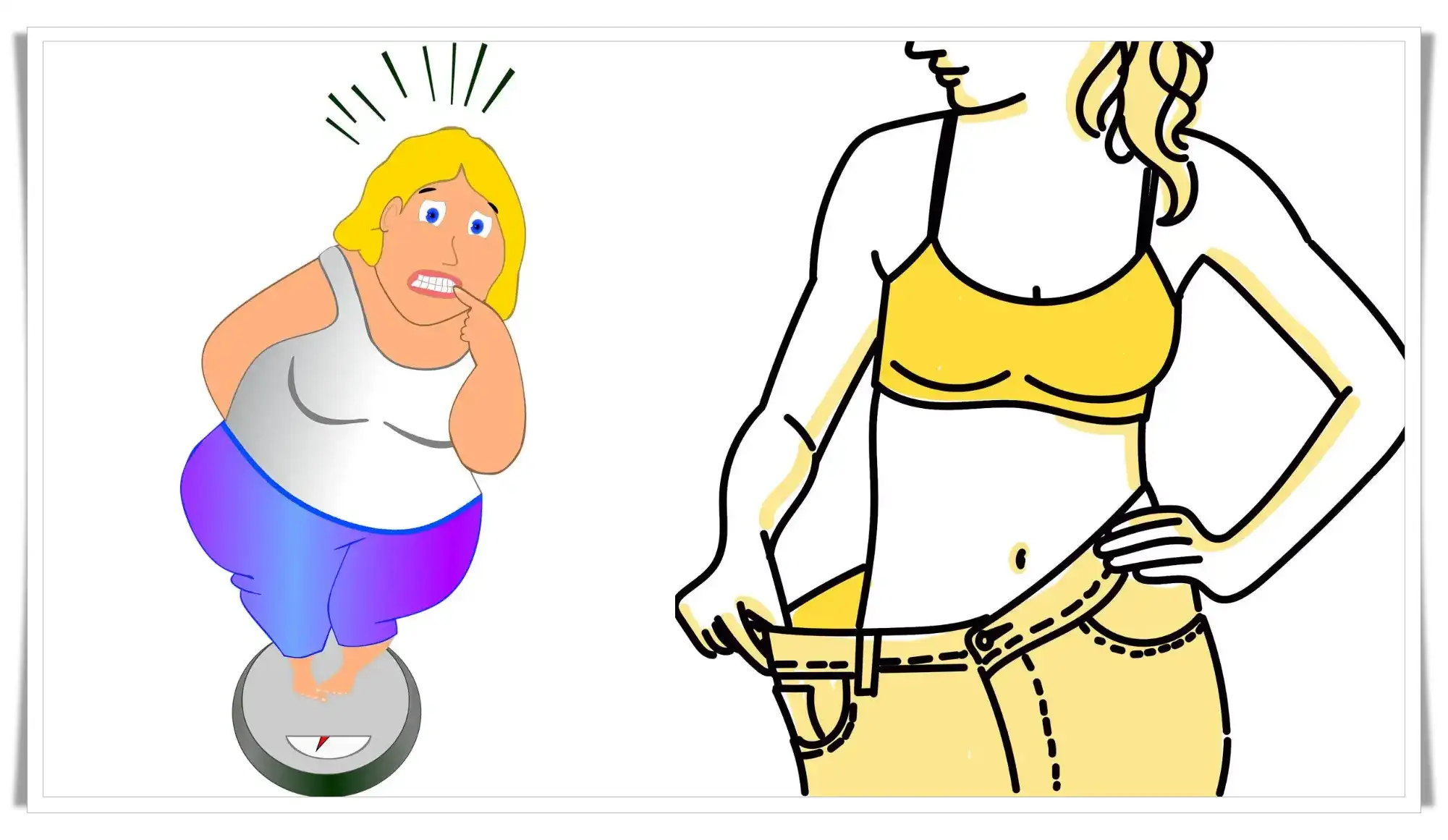


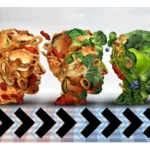
This was beautiful Admin. Thank you for your reflections.
Wow, incredible weblog layout! How long have you
ever been blogging for? you made blogging look easy.
The overall glance of your website is great, let alone the content material!
You can see similar: najlepszy sklep
and here sklep internetowy